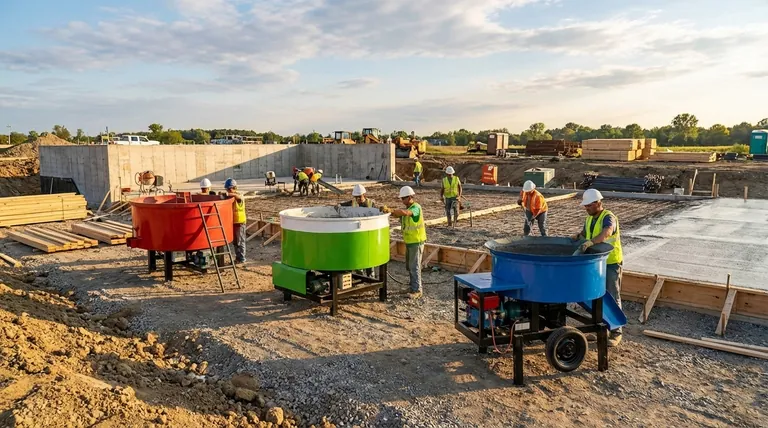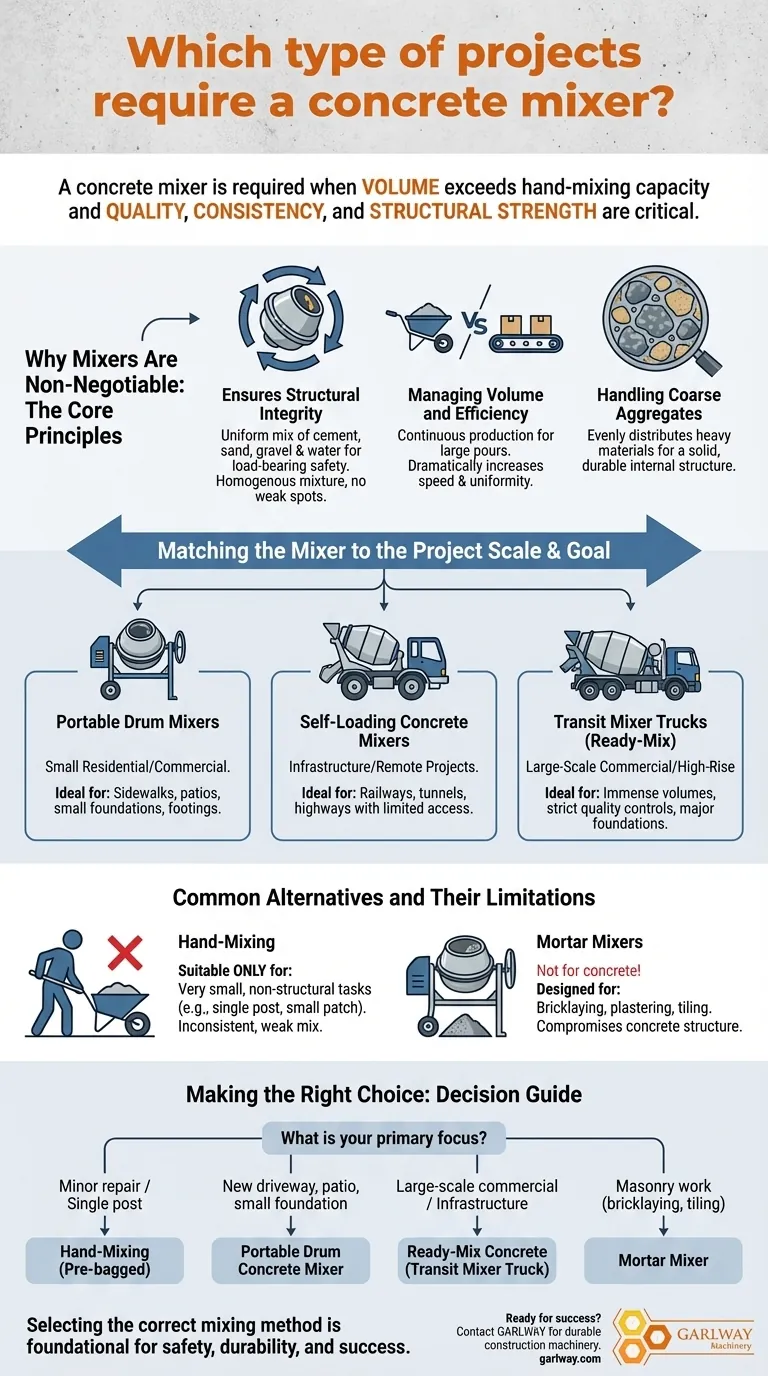In short, a concrete mixer is required for any project where the volume of concrete exceeds what can be practically mixed by hand, and where the structural strength and consistency of the final product are critical. This typically includes projects like building foundations, pouring driveways, creating patios, or casting large slabs.
The decision to use a concrete mixer is driven by two key factors: volume and quality. While small repairs can be done by hand, a mixer becomes essential when the job requires a consistent, homogenous, and structurally sound mix that is simply unachievable through manual labor.

The Core Principle: Why Mixers Are Non-Negotiable
A concrete mixer isn't just a labor-saving device; it's a tool for ensuring quality control. The strength of concrete depends on the precise and uniform combination of cement, sand, gravel (aggregate), and water.
Ensuring Structural Integrity
A mixer's rotating drum and internal blades continuously lift and tumble the materials. This action guarantees that every particle of sand and gravel is coated with cement paste, creating a homogenous mixture free of weak spots.
For any load-bearing application, such as a foundation or a driveway, this consistency is non-negotiable for safety and long-term durability.
Managing Volume and Efficiency
Manually mixing concrete in a wheelbarrow is physically demanding and slow. For anything beyond a few small bags, this method becomes impractical.
A mixer allows for the continuous production of uniform batches, dramatically increasing efficiency and ensuring the entire pour maintains the same quality from start to finish.
Handling Coarse Aggregates
Strong concrete relies on coarse aggregates like gravel to form a solid internal structure. A mechanical mixer is specifically designed to handle and evenly distribute these heavy materials.
Attempting to do this effectively by hand is extremely difficult and often results in a poor-quality, inconsistent mix.
Matching the Mixer to the Project Scale
Not all mixers are created equal. The type of mixer required is directly related to the size and location of the project.
Portable Drum Mixers
These are the common mixers seen on residential and small commercial job sites. They are ideal for projects like pouring sidewalks, patios, footings, and small equipment slabs. Their capacity is well-suited for on-site mixing where controlled batches are needed.
Self-Loading Concrete Mixers
These specialized machines are used for infrastructure or remote construction projects. They can load their own raw materials, mix them, and transport the concrete on-site.
This makes them invaluable for building railways, bridge tunnels, or township highways where access to a batching plant is limited.
Transit Mixer Trucks (Ready-Mix)
For large-scale projects like high-rise buildings, major highways, or large commercial foundations, the required volume of concrete is immense.
In these cases, ready-mix concrete is produced at a dedicated plant under strict quality controls and delivered to the site in transit mixer trucks.
Common Alternatives and Their Limitations
While a mixer is essential for most structural work, it's important to understand the alternatives for very small jobs and to recognize tools that are often confused with concrete mixers.
Hand-Mixing
Mixing concrete with a shovel in a wheelbarrow or tub is only suitable for very small tasks, such as setting a single fence post or patching a small crack. It is not recommended for any structural application due to the high likelihood of an inconsistent, weak mix.
Mortar Mixers
A mortar mixer is not a concrete mixer. It is designed to blend finer materials like cement, sand, and lime to create smooth mortar for bricklaying, plastering, or tiling. Using a mortar mixer for concrete will fail to properly combine the coarse aggregates, resulting in a compromised final product.
Making the Right Choice for Your Project
Your project's goal dictates the necessary tools. Use this guide to make a clear decision.
- If your primary focus is a minor repair or setting a single post: Hand-mixing pre-bagged concrete is a practical and sufficient solution.
- If your primary focus is a new driveway, patio, or small foundation: A portable drum concrete mixer is the essential tool for the job.
- If your primary focus is a large-scale commercial or infrastructure project: You will require professionally produced ready-mix concrete delivered by transit mixer trucks.
- If your primary focus is masonry work like bricklaying or tiling: You need a mortar mixer, which is specifically designed for fine, smooth mixtures.
Ultimately, selecting the correct mixing method is the foundational step in ensuring the safety, durability, and success of your project.
Summary Table:
| Project Type | Recommended Mixer | Key Reason |
|---|---|---|
| Driveways, Patios, Small Foundations | Portable Drum Mixer | Ensures consistent, homogenous mix for structural integrity |
| Large-Scale Commercial/Infrastructure | Transit Mixer Truck (Ready-Mix) | Handles immense volume with strict quality control |
| Remote Sites (Railways, Tunnels) | Self-Loading Mixer | Provides on-site material loading and mixing capability |
| Minor Repairs/Single Posts | Hand-Mixing | Suitable for very small, non-structural tasks only |
Ready to ensure your project's success with the right concrete mixer?
GARLWAY specializes in providing durable and efficient construction machinery, including concrete mixers, winches, and batching plants, tailored for construction companies and contractors worldwide.
Let us help you achieve consistent quality and superior efficiency on your next job. Contact GARLWAY today for a expert consultation and quote!
Visual Guide

Related Products
- Ready Mixer Machine for Construction Ready Mix Machinery
- Commercial Construction Mixer Machine for Soil Cement Mixing Concrete
- Auto Concrete Cement Mixer Machine New
- Construction Products Concrete Plant Machine Mixing Concrete Mixer
- JDC350 Small Cement Concrete Mortar Mixer
People Also Ask
- What should be considered regarding the output of a concrete mixer? Match Capacity to Your Project Scale
- What safety considerations are important for concrete mixer operation? A Guide to Proactive Risk Management
- Can a concrete mixer be used for mortar? Understanding the trade-offs for your project
- When was the first concrete mixer developed and by whom? Discover the 1900 Breakthrough
- What was significant about Roscoe Lee's 1934 concrete mixer design? Pioneering Modular Construction Equipment



















